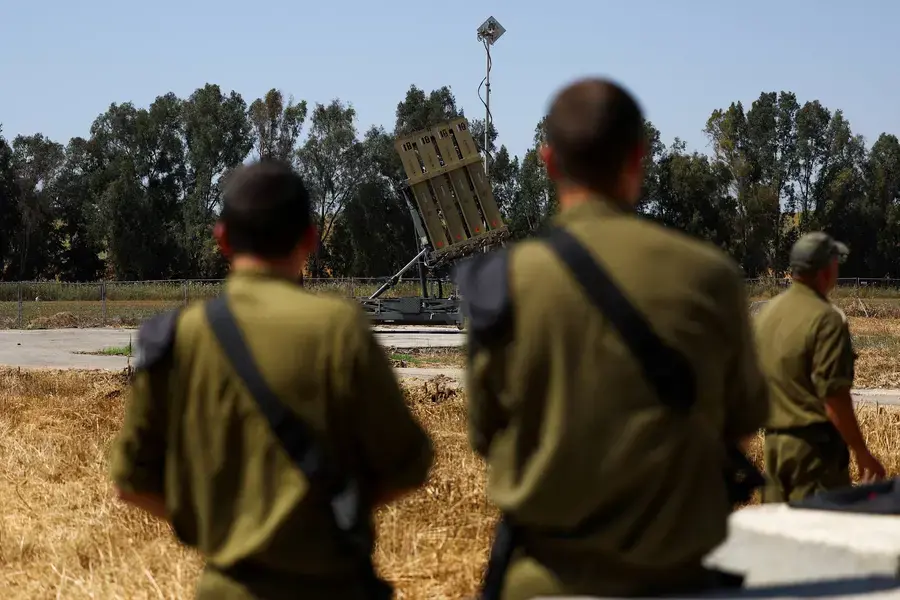The President’s Inbox Recap: Iran’s Attack on Israel

The latest episode of The President’s Inbox is live! This week, I spoke with my CFR colleagues, Steven A. Cook and Ray Takeyh.
Iran’s Attack on Israel, With Steven Cook and Ray Takeyh
Steven Cook, the Eni Enrico Mattei Senior Fellow for Middle East and Africa Studies at CFR, and Ray Takeyh, the Hasib J. Sabbagh senior fellow for Middle East studies at CFR, sit down with James M. Lindsay to discuss Iran’s unprecedented attack on Israel and the prospects for a broader Middle East war.
Here are seven highlights from our conversation:
1.) Iran’s attack on Israel last weekend was unprecedented. Iran and Israel have been fighting a shadow war for decades. Iran has encouraged proxies like Hezbollah to attack Israel, but it has refrained from doing so itself, giving Tehran a measure of plausible deniability. Israel has waged a covert war against Iran, and particularly its nuclear program, in a way that has given Jerusalem a similar degree of plausible deniability. Saturday’s attack involving more than three hundred drones and missiles clearly originated from Iran. A line was crossed, and a new chapter opened in the conflict between Iran and Israel.
More on:
2.) Iran’s attack came in response to an Israeli airstrike on what Iran says was its consulate in Damascus. The Israeli attack on April 1 killed two senior Iranian generals among several others. Ray noted that the airstrike “was certainly the proximate cause” for Iran’s attack on Saturday, though he cautioned that “the Israelis do insist that the building was not actually recognized as a diplomatic sanctuary in the sense that the Iranians had not registered with the government of Syria.”
3.) It’s unclear why Iran chose to attack Israel directly rather than rely on proxies. Ray noted that Iran could have struck at Israel, including at Israeli diplomatic facilities, from outside Iranian territory. That it chose not to do so could reflect several calculations. Tehran might have concluded that Israel was too weakened or distracted by its war on Hamas, or too isolated internationally, to respond to a direct Iranian attack. Tehran may also have wanted to reassure its proxies that it too was willing to attack Israel. Or it may be that the new leadership in Tehran is more risk acceptant. As Ray put it, “We don't know much about the new elites. Not that the old one was comprehensible to us, but they seem to be bolder and more reckless as their conduct indicated this past week.”
4.) Iran intended to kill a large number of Israelis. Some experts argue that Iran’s attack was performative. They point to the fact that Iran warned the United States of the attack, that Hezbollah did not join the Iranian attack by trying to overwhelm Israel’s defense with its rockets and missiles, and that the Iranian mission to the United Nations tweeted on Saturday night after the attack that “the matter can be deemed concluded.” Both Ray and Steven questioned that line of argument, noting that that it rests on the heroic assumption that Iran knew Israel would defeat the attack. If even a few missiles or drones had penetrated Israel’s defenses and killed Israelis, we would be in an even more dangerous situation today.
5.) The Iranian attack was defeated by a coalition of countries. The United States, the United Kingdom, and France all joined with Israel to shoot down the Iranian salvo. Many of the drones were shot down over Jordanian and Saudi airspace, suggesting that Amman and Riyadh both cooperated with the defensive effort. Steven pointed out that “the Jordanians have made the case that this was not a defense of Israel. It was a defense of their sovereignty and their airspace, and that if drones and missiles were going in the opposite direction, they would do the exact same thing.”
6.) Israel’s coalition partners want it to exercise restraint in the face of the Iranian attack. President Joe Biden urged Israel to “take the win” and told Israeli Prime Minister Benjamin Netanyahu that the United States would not participate in an attack on Iran. Officials in London and Paris said much the same thing. Ray disagreed with that position, arguing that a “separation between Israel and the United States at this critical time does not serve the cause of deterrence, that historically the Iranians tend to respect latent American power irrespective of who the incumbent is, of whichever party, just American power.” Ray believes that had Biden taken a harder line, “the perception by the Iranians that Americans would support the escalation of the conflict could be an act of deterrence in and of itself.”
More on:
7.) It is a matter of when, not if, Israel will respond to the attack. Ray and Steven agreed that Israel would not let the Iranian attack go unanswered, even though Israeli security forces are being stretched by the war in Gaza, deterring Hezbollah in the north, and securing the West Bank. Steven said, “I don't think that there's really any question at this point that the Israelis are going to let this go by.” As Israel’s attack on Isfahan last night showed, they weren’t. The question now is whether there is an “off ramp” to avoid further escalation in the fighting given the appearance that both countries want to get in the last punch. Both Ray and Steven were skeptical that there is.
If you’re looking to read more of Steven’s analysis of the attack, check out his In Brief “Iran Attack Means an Even Tougher Balancing Act for the U.S. in the Middle East.” Ray also wrote an In Brief for CFR. It is titled “Iran Attacks on Israel Spur Escalation Concerns.” He also co-wrote a piece for the New York Times titled “Keeping U.S. Power Behind Israel Will Keep Iran at Bay.”
 Online Store
Online Store